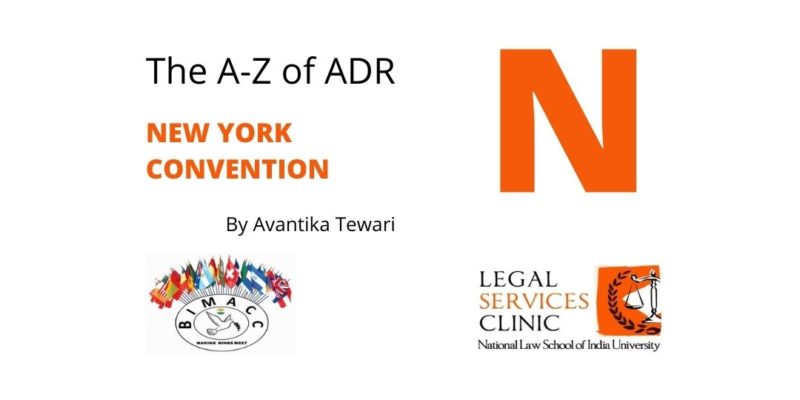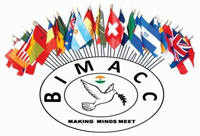
A-Z of ADR: New York Convention
-Avantika Tewari (II Year, NLSIU Bangalore)
The New York Convention or the Convention on the Recognition and Enforcement of Arbitral Awards (1958) was signed and subsequently ratified by India on June 10, 1958, and July 13, 1960, respectively. Despite being one of the earliest parties to the Convention, the country has held the perception of being a ‘non-amicable’ arbitration jurisdiction for several decades. This is primarily owing to the interventionist approach adopted by the courts in India. Fortunately, in recent years, the Supreme Court of India has made palpable efforts towards curbing such interventionism by pronouncing various pro-arbitration verdicts.
Part 2 of the Arbitration and Conciliation Act of India, 1996 provides for the implementation of certain foreign awards, while Chapter I therein contains provisions dealing specifically with Convention awards (Sections 44 to 52). Clause (b) of Section 44 of the Act[1] states that a “foreign award” ought to have been made in a territory such that the Indian Government, upon being convinced of reciprocity, may by notifying in the Official Gazette, proclaim the territory as being within the ambit of the Convention’s applicability. Nevertheless, this requisite of gazette declaration must be expunged from the Act to integrate India’s arbitration practices with the international standards of the Convention.
This gazetting desideratum limits the applicability of the Convention only to recognition and implementation of awards made in another Contracting State’s territory. Additionally, this requisite is detrimental to the objectives of clauses 1 and 2 of Article I of the Convention, because it shrouds in uncertainty the enforcement of awards made in countries that are Contracting Parties to the Convention but haven’t received official notification in the Indian Gazette.
The Apex Court construed an arbitral award made in 1995 in Ukraine as a “foreign award” in the prominent case of Transocean Shipping Agency P. Ltd vs Black Sea Shipping & Ors.[2], despite the country not being a gazetted one. The Hon’ble judges adduced that since Ukraine was a part of the USSR (erstwhile), that itself had been acknowledged as a territory to which the Convention was applicable, through a notification issued on February 7, 1972, India had recognized Ukraine within the aforementioned territory simultaneously. Intriguingly, Ukraine was no longer a part of the Soviet Union the date the award was pronounced. Nevertheless, the fact that the country had been a signatory to the Convention right from the 1960s, and held the same status post the Union’s disintegration in the early 1990s, prevailed over the stringent gazetting precondition. Unfortunately, this issue has not been dealt with in both the 2015[3] and 2018[4] (proposed) Amendments to the 1996 Act.
Section 46, Part II, Chapter I of the Act[5] specifies that all Convention awards would be treated as binding for all purposes. Some arbitration experts adduce that an absence of a merit-based recourse makes a Convention award binding. However, such an assertion raises certain issues. Issue numero uno is that the Act incorrectly defines “when” foreign awards assume a binding character. Article III of the Convention[6] unequivocally states that all awards under it are indissoluble, which indicates that an award’s enforceability cannot be tantamount to pre-requisite for its binding force. Furthermore, contracting parties undertake obligations comprising obligatory an arbitral award. Thus, this Section should be synchronized with the Convention’s provisions.[7]
Additionally, such interpretation by experts induces ambiguity between an award’s certitude and its binding nature. An award that cannot be impugned on merits would be ‘final’, while it can stay indissoluble from the time of getting issued till the procurement of finality. Thus, finality cannot be used as a definitive yardstick for the ascertainment of binding character.
In the matter of nullified foreign awards,[8] the courts in India rely on two requisites, as upheld in Bharat Aluminium Co v. Kaiser Aluminium Technical Services[9], a watershed verdict that ushered a new era for Indian arbitration. The two requisites are utilized alternatively. The court has to be convinced that the award was quashed either in the country where it was made or in the country under whose law the award was pronounced. The latter is considered as an exception in case courts of the first alternative lacked jurisdiction to abrogate the award. This approach adopted by the courts is in accordance with the Convention, as the quashing of foreign awards by courts of primary judicial competence is an instrumentality, albeit national courts are vested with the discretion of implementing rescinded awards. Such discretion can be exercised in cases where the annulled award’s premise remains valid, where the court of abrogation has utilized its local legislation powers (unacknowledged under Indian law) and public policy matters. The Indian Parliament has fortunately introduced Explanations 1 and 2 to Clause 2 of Section 48 of the Act, via the Amendment made in 2015[10] to curb the misappropriation of public policy as a ground to hamper judicial proceedings.
India is a signatory to the ‘Hague Convention on Service Abroad of Judicial and Extrajudicial Documents in Civil or Commercial Matters 1965’ (Hague Convention) and the procedure applicable to service of judicial and extrajudicial documents to a defendant present in the Indian jurisdiction. Nevertheless, India has made explicit certain circumscriptions with regards to Article X of the Convention,[11] disapproving these modes of service: –
- Direct Delivery of legal documents via postal channels to individuals in foreign countries.
- Effecting service of legal documents directly via the judicial officers or other eligible persons of the state of destination through any individual interested in a judicial proceeding, judicial officers or other qualified persons of the destination state.
Thus, India has only rendered approbation to the transmission procedure mentioned under Article V of the Convention[12] as valid service of legal or extra-legal documents. The Central Authority designated for such procedure in India is the Union Ministry of Law and Justice.
[1] Section 44, the Indian Arbitration and Conciliation Act, 1996.
[2] 1998 (2) SCC 281.
[3] The Arbitration and Conciliation (Amendment) Act, 2015.
[4] The Arbitration and Conciliation (Amendment) Bill, 2018.
[5] Section 46, The Indian Arbitration and Conciliation Act, 1996.
[6] Article 3, Convention on the Recognition and Enforcement of Foreign Arbitral Awards (New York, 1958).
[7] Subhiksh Vasudev, ‘Has India Truly Delivered on Its Obligations under Articles I and V of the New York Convention Over the Last 60 Years?’ (Kluwer Arbitration, 29 November, 2018) <http://arbitrationblog.kluwerarbitration.com/2018/11/29/has-india-truly-delivered-on-its-obligations-under-articles-i-and-v-of-the-new-york-convention-over-the-last-60-years/?doing_wp_cron=1596283856.5563530921936035156250 > accessed 30 July 2020.
[8] Section 48, The Indian Arbitration and Conciliation Act, 1996
[9] Civil Appeal 3678 of 2007 (6 September 2012).
[10] Section 48, The Arbitration and Conciliation (Amendment) Act, 2015
[11] Article 10, The Hague Convention on Service Abroad of Judicial and Extrajudicial Documents in Civil or Commercial Matters 1965.
[12] Article 5, The Hague Convention on Service Abroad of Judicial and Extrajudicial Documents in Civil or Commercial Matters 1965.
-Avantika Tewari (II Year, NLSIU Bangalore)
Avantika Tewari is a second-year student from the National Law School of India University (NLSIU), Bangalore.
BIMACC expresses its gratitude towards the author and to the members of the Legal Services Clinic, National Law School of India University (NLSIU) for their support in our collaborative efforts to promote ADR with this series titled “A-Z of ADR”. The purpose of this series is to increase the understanding of certain fundamental concepts of Alternative Dispute Resolution.
The Legal Services Clinic is a student-run committee that provides free legal services to the socially and the economically backward sections of the society who have difficulty accessing the judicial system. It also has a mandate of spreading legal awareness and providing free legal assistance to those who cannot afford it.
Website: www.legalservicesclinic.org/
Facebook: @legalservicesclinic
Email: lsc.nlsiu@gmail.com
Phone Number: 073586 73214
Disclaimer: The views and opinions expressed in this blog are those of the author and do not necessarily reflect the official policy or position of BIMACC, any of the members of the Board, or the empanelled neutrals. This blog is for informative purpose only and does not constitute legal advice in any manner whatsoever.
